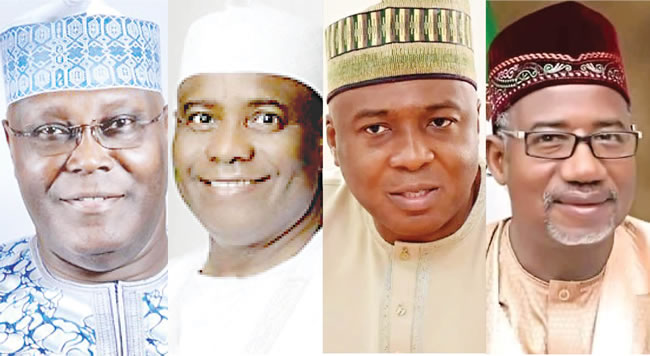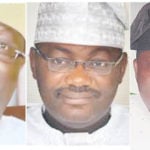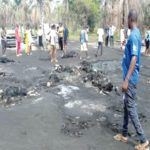Power rotation is threatening PDP’s chances to return to power in 2023. LEON USIGBE analyses the contending issues.
Under the general provisions in Chapter 1, the Peoples Democratic Party (PDP) Constitution gives it a set of aims and objectives to pursue and the manner of doing it. Central to it is article 7 (3) (c), which states that it should be done by “adhering to the policy of the rotation and zoning of the party and public elective offices in pursuance of the principle of equity, justice and fairness.” The idea behind it is to have a political party with a unified sense of purpose that will be home to people of similar ideology, no matter their ethnic, religious or social background. That appeared to have worked for the former ruling party from 1998. But now, it has become a sore point and an albatross to the realisation of its hopes for a bounce back to power next year.
Seventeen aspirants are now jostling for the party’s presidential ticket amid arguments that the position should be zoned as prescribed by the grund norm or thrown open for the political exigencies of the times. The first argument looks back to 2019 when it was zoned to the North and Atiku Abubakar from Adamawa State, North-East, was selected as the standard-bearer. This point of view stresses that equity demands come to the South in 2023. It also points to the outgoing tenure of President Muhammadu Buhari, a Katsina State, North-West indigene, who would have been eight years in the saddle by May 2023. This means that a northern successor will place the office of the Nigerian president firmly in the North for a minimum of 12 years or even, 16 at a stretch in case of re-election of the individual. Proponents of zoning view that as lacking in equity, justice and fairness.
On the other hand, advocates of open ticket suggest that the PDP should first be interested in how to win the election rather than be obsessed with where the presidential candidate will come from. They argue that it is only by throwing the ticket open that the main opposition party can put its best foot forward and also seem to believe that the candidate that will bring it the desired election victory at this time may only be found in the North. With time running out, these contrasting positions have left the PDP dangerously fractured in the run-up to the 2023 presidential poll.
The first signs of this emerged from the inability of the Governor Sam Ortom-led PDP Zoning Committee to reach a common ground as the tendencies that exist in the party over zoning manifested in the membership of the committee and basically rendered its assignment inconclusive. The best it could do was to throw the ball to the court of the National Executive Committee (NEC) to resolve the knotty question.
Atiku Abubakar
Of the 17 aspirants, five are from the North and the majority of 12 is from the South. This demography itself is indicative of the dominant sentiment concerning whose turn it is to produce the PDP candidate. But former vice president, Atiku; Sokoto State governor, Aminu Tambuwal, his Bauchi State counterpart, Bala Mohammed; a former president of the Senate, Bukola Saraki, and former banker, Mohammed Hayatu-Deen, from the North, are insistent that there is the need to jettison the zoning article for purpose of this election. Even though since the recent rise in political crescendo, Atiku has been reticent on the issue, his position has, nonetheless, remains that he refused to snatch the PDP ticket from President Olusegun Obasanjo in 2003 despite the pressure from state governors because he was an apostle of retaining the post in the South. However, he justifies his present move for the ticket on the ground that the South has enjoyed more years in power under this democratic dispensation than the North.
Bala Mohammed, Hayatu-Deen
Hayatu-Deen has hardly voiced any opinion on zoning. He remains in the race all the same while Governor Mohammed is projecting himself as not desperate for the ticket but a nationalist who as a Senator, played a key role in the National Assembly’s Doctrine of Necessity that confirmed Dr Goodluck Jonathan, a southerner, as acting president against the resistance from the shadowy cabal. “And that is the beginning of justice and equity; giving Nigerians a level-playing field, respecting each other and knowing that each partner is a veritable partner in the transcendental journey of making Nigeria one. And of course, in doing that, we have built bridges,” he posited during his recent engagement with party leaders, adding: “I’m ready to use my position to be a unifier, to be a servant and respect the supremacy of the party, to give this party dignity and respect…I believe I’m one of the best. But if I’m not found to be the best, I’m ready to work with anybody that you will bring out. That should be understood.”
Aminu Tambuwal
Tambuwal has been in this position before and likes to recall with glee how he became the Speaker of the House of Representatives, in spite of the zoning policy put in place by the PDP in 2011. Hear him: “We had many members that returned, very experienced, and we saw the need for the House to have its own leadership evolve from amongst itself, not necessarily relying on what the party was about to do in terms of zoning. So, meetings began. And at our own grouping, we zeroed in on EmekaIhedioha to be the speaker and we started the movement, and we were doing the numbers. We took so many things into consideration; variables, indices, demography of members, and whatever. We realised that should Emeka be the speaker, there would be a problem. Members approached me and said that I should be the one. I said no, instead of me, let us draw up criteria of the speaker that we want for the 7th House Representatives.
“And they came back to say Aminu, these criteria, look at it; it’s you. We went back, sat down and convinced Emeka Ihedioha. He accepted. Okay, if Emeka is not going to be the speaker, he should be deputy speaker. And when they came, I said, look, you may need to do me a favour. I want you to go to Sokoto and see some of my leaders. Let them support this. Let there be no pressure from home that would make me chicken out halfway. They went. They saw the people. I’ll mention what President Shehu Shagari told them. ‘Aminu is my son. You want to put him forward for this?’ They said yes. ‘I appeal to you not to make this sectional project or a religious project. Let it be a pan-Nigerian national project.’ And they took his advice and came back. I got the clearance from home. I said, well, I’m good to go. The rest is history.” Many PDP faithful expect him to be similarly recalcitrant should the decision not favour his zone.
Bukola Saraki
Saraki is of the opinion that the ruling All Progressives Congress (APC) has left Nigeria in a shambles and the condition of the country at the moment does not leave room for the emergence of the PDP standard-bearer through zoning. His argument to the party leaders is: “and as such, Your Excellencies, we don’t have the pleasure or the luxury to not choose right or elect right (the person) who will lead us ahead. That luxury, we have lost it because of the danger that we find ourselves today. This is not the time for us to take chances on who should lead us. This is not the time for us to be sentimental on who should lead us. You’re experienced enough, you’re exposed enough, you’re knowledgeable enough to know the kind of president, the kind of flag bearer we need in this party.
“Today, the kind of president we need is a president that understands these issues. If the president does not understand the issues as we have seen, he cannot provide leadership. This is a fact. If the president doesn’t understand the issues, he cannot provide leadership. You cannot lead what you don’t know. It leads to confusion. The advisers become the president. The aides become the president. The person you put there is not the person who is leading the country.
“The kind of president we need today must be a president that can unite. There is pain in the land, there is division in the land. You cannot unite if you don’t have the characteristics or the qualities to unite people. You cannot acquire it overnight. You must have the skill to unite. Some of us, myself in particular, by virtue of the experiences we have picked up from roles we have played in this country, can provide unity…For you to unite, you must be a bridge. I can provide a bridge between the North and the South in this country today. I can provide a bridge between the Christians and the Muslims in this country today. I can provide a bridge between the young and the old in this country today. I can provide a bridge between what I call the private sector and government leaders.”
The push back and Anyim
Governor Nyesom Wike of Rivers State, himself an aspirant, has been ambiguous on his stance on zoning. At one time, he had been non-committal towards the principle and at other times, he seemed to have defended it. “I will abide by the party’s decision on zoning even if they zone it to the North. I won’t contest if they zone it to the North,” Wike posited once but maintained later: “Forget about the people saying there should not be zoning. It is just a distraction. For me, those doing that are agents of the APC and they are not helping the party. Whichever way, we must sit down and make the best decision that will make Nigerians happy, that will make us win the election.”
Peter Obi is not far from this position despite also insisting on equity, justice and fairness in reaching any decision on zoning. “What we want to say is that a nation must be built on fairness, must be built on equity, must be built on respect for each other and we in the South-East are saying we too should be allowed to serve and I assure you that the opportunity will change Nigeria,” he says. But his co-aspirants from the South-East have been more vehement in their calls for the PDP to stick to the principle.
Against Wike and Obi’s ambivalence, former president of the Senate, Anyim Pius Anyim, has become the most strident voice from the South among the aspirants rooting for power rotation. He made sure that the PDP National Working Committee (NWC) got the point when he sought their support for his ambition. “If I appear before you today without touching on the raging issues of zoning in our party, my presentation will not be complete. As a true party man, I will abide by the decision of the party. However, I would like to put the following on record: Democracy thrives on three ‘certainties’ – Certainty of tenure, Certainty of structure, Certainty of process. If at any time, any of these ‘certainties’ are no longer guaranteed, democracy will corrupt justice and enthrone inequity. Accordingly, my appeal is that zoning, being a fundamental principle of our party, should not be jettisoned. Democracy, being a system of rules and order, depends on strong institutions for its sustenance and success. When a system can no longer defend its rules, it will enthrone the reign of might as against the rule of law. My appeal is that PDP should defend Sec. 7 (3) (c) of its constitution. I seek your prayers and partnership on this collective journey.”
Anyim warned that if zoning is not applied for the 2023 election, the PDP will be weakened and will be unable to protect its members.
For the moment, there is an assurance from the PDP national chairman, Senator IyorchiaAyu, that the leadership will play the role of an unbiased umpire in determining the route to select the party flag bearer, a decision, he says, will be made by the party members. However, some observers fear that Ayu’s non-definite stance on the matter leaves the possibility of shunning article 7. But the decision now rests with the NEC, which is likely to be convened soon.






